2013高一英语直接引语变间接引语(1)(2)(3)
高一英语直接引语和间接引语
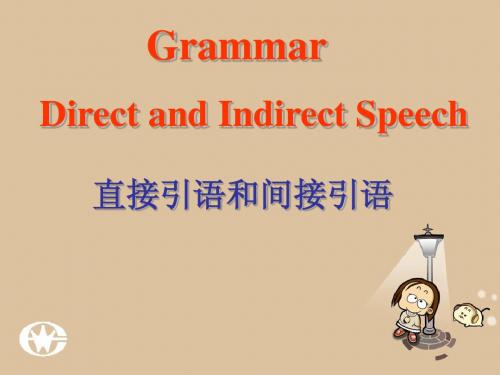
选择疑问句 •用whether…or…表达,而不用if…or…,也 不用either…or… • He asked, “Do you speak English or French?” • He asked me whether I spoke English or French. • I asked, “Will you take a bus or take a train?” • I asked him whether he would take a bus or take a train.
在直接引语变为间接引语时需要注意的变化 1. 注意时态的变化 2. 注意人称变化。
3. 注意指示代词的变化
4. 注意时间的变化 5. 注意地点的变化 6. 注意个别趋向动词的变化
直接引语
间接引语
指示代词
时 间 状 语
this, these that, those now, today then, that day this week that week yesterday the day before last week the week before four days ago four days before yesterday the day before the day before two days before yesterday the next day tomorrow the next month next month
4. “Why were you late again?” The teacher said to me. The teacher asked me why I was late again. 5. “I don’t like swimming,” said Sarah. Sarah said she didn’t like swimming. 6. His friends asked him if he would go to Dalian. His friends asked him, “Will you go to Dalian?” 7. “Have you been to Paris?” My classmate asked me. My classmate asked me if I had been to Paris.
高中英语直接引语变间接引语(35张PPT)

➢句子结构的变化
1. 直接引语是陈述句,变为间接引语的方法 引导词为: that 语序: 不变
• He said, “I have been to the Great Wall. ” • He said that he had been to the Great Wall. • He said, “I'll give you an exam next Monday. ”
Direct Speech & Indirect speech
直接引语: 妈妈说:” 杰克是个好工人“. Direct speech:
Mother said :”Jack is a good worker.” 间接引语:妈妈说杰克是个好工人。 Indirect speech: Mother said that Jack is a good worker
小结:
➢ 在直接引语变为间接引语时需要注意的变化 1.注意时态的变化; 2.注意人称变化; 3.注意指示代词的变化; 4.注意时间状语的变化; 5.注意地点状语的变化; 6.注意个别趋向动词的变化。
将下列句子转换为间接引语:
1. He said,“ I have finished my homework last night”. He said that he had finished his homework the night before.
⑤直接引语如果是以“Let's”开头的祈使句,变为间 接引语时,通常用“suggest +动名词(或从句)” 如: He said, "Let's go to the movies."
→He suggested going to the movies. 或He suggested that they go to see the movies.
高一英语直接引语和间接引语
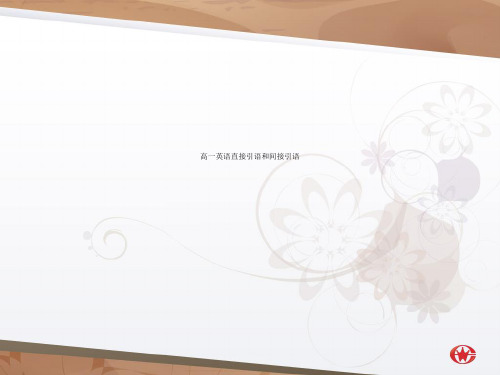
He asked her whether/if she had passed the exam.
Exercise
1. “I like reading adventure stories,” said John. John said that he liked reading adventure stories.
• “I was driving carefully when my car hit the tree.” He told the police.
• He told the police that he had been driving carefully when his car hit the tree.” He told the police.
He said to me, “I’ve left my book in your room.”
He told me that he had left his book in my room.
状 直接引语中的状语 语 now 变 ago 化 today
间接引语中的状语
then before/earlier that day
Phelps said he had started swimming at an young age in order to treat his ADHD disease.
“I receive a 5-hour training every day.”
Phelps said he received a 5-hour training every day.
“I always desire to be the winner, to win gold medals and to break world records.”
直接引语变间接引语(带练习和答案)

直接引语变间接引语(带练习和答案)直接引语和间接引语直接引语就是直接引⽤别⼈的话。
间接引语就是⽤⾃⼰的话转述别⼈的话。
间接引语多为宾语从句。
1. 直接引语变间接引语的⽅法(1) 直接引语如果是陈述句,间接引语应改为由that引导的宾语从句。
(that可省略)She said, “Our bus will arrive in five minutes.”→She said (that) their bus would arrive in five minutes.(2) 直接引语如果是反意疑问句,选择疑问句或⼀般疑问句,间接引语应改为由whether或if引导的宾语从句。
(宾语从句必须⽤陈述句语序)He said, “Can you swim, John”→ He asked John if he could swim.“You have finished the homework, haven’t you” my mother asked.→ My mother asked me whether I had finished the homework.He asked, “Do you go to school by bus or by bike”→ He asked me if I went to school by bus or by bike.She says, “Is Tom an Englishman”→ She asks whether/if Tom is an Englishman.注:主句引述动词是say时,要改为ask或wonder等。
(3) 直接引语如果是特殊疑问句,间接引语应该改为由原来的疑问词引导的宾语从句。
(宾语从句必须⽤陈述句语序)She asked me, “When do they have their dinner”→ She asked me when they had their dinner.(4) 直接引语如果是祈使句,间接引语应改为“tell/ask/order sb.(not) to do sth.”句型。
直接引语变间接引语(记住这5变)
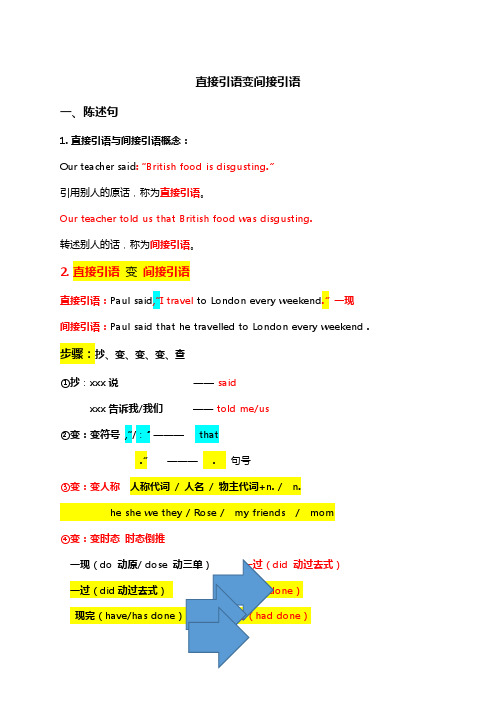
直接引语变间接引语一、陈述句1.直接引语与间接引语概念:Our teacher said: “British food is disgusting.”引用别人的原话,称为直接引语。
Our teacher told us that British food was disgusting.转述别人的话,称为间接引语。
2.直接引语变间接引语直接引语:Paul said,“I travel to London every weekend.”一现间接引语:Paul said that he travelled to London every weekend .步骤:抄、变、变、变、查①抄:xxx说——saidxxx告诉我/我们—— told me/us②变:变符号,“/:“———that.”——— . 句号③变:变人称人称代词/ 人名/ 物主代词+n. / n.he she we they / Rose / my friends / mom④变:变时态时态倒推)现进(was/were+doing)一将动原/ wouldn’t+动原)情态动词:改变:cancan’t不变:shouldshouldn’t⑥查:注意:She told me that...√ She said that...√She told that...× She said me that...×二、一般疑问句(可以用Yes/No 回答的问句)Paul asked me : “Are you watching the match?"Paul asked me if I was watching the match.步骤:抄变变变变查1 抄:____ asked _____宾语/人名/物主代词+ n./ n.me/Jack/her friends/ mom2 变:变符号:“ / ,“ → if/whether +主语(人/物)?” → .句号3 变:变人称人称代词/人名/物主代词+ n./ n.4 变:变时态时态倒推一般现在时(do) → 一般过去时(did) → 过去完成时(had done) → 过去完成时现在完成时(have done)现在进行时(am/is/are doing) → 过去进行时(was/were doing)一般将来时(will/won't +动词原形)→ 过去将来时(would/wouldn't +动词原形)情态动词can/can't → could/couldn't + 动词原形不变:should → should + 动词原形shouldn't → shouldn't5 变:变语序陈述语序(主语+ be/动词)6 查:句意查一遍练习:1. 一般现在时(do) → 一般过去时(did)Henry asked me: “Do you always wear a scarf?"Do 的作用:①判断句型:一般疑问句②判断时态:一般现在时Henry asked me if I always wore a scarf.2. 一般过去时(did) → 过去完成时(had done)Jack asked me: “Did yo u go to the party?"Did 作用:①判断句型②判断时态③还原时态:动原→动过去式一般疑问句一般过去时you went to the partyJack asked me if I had gone to the party.3. 现在完成时(have done) → 过去完成时(had done)Jack asked his friend: “Have you read the Little Prince?"Jack asked his friend if they had read the Little Prince.4. 现在进行时(am/is/are doing) → 过去进行时(was/were doing) Jack asked Lily and Rose: “Are you painting?"Jack asked Lily and Rose if they were painting.5. will/won't → would/wouldn'tJack asked his dad: “Will we go travelling during the gap year ?" Jack asked his dad if they would go travelling during the gap year.6. can/can't → could/couldn'tJack: “Can you swim, grandpa ?"Jack asked his grandpa if he could swim.7. should/shouldn't → should/shouldn'tTara:Should I bring a coat?Tara asked herself if she should bring a coat.三、直接引语变间接引语——特殊疑问句(含有特殊疑问词且不可以用Yes/No 回答的疑问句)Paul asked me : “What are you reading?"Paul asked me what I was doing .步骤:抄变变变变查①抄:____ asked _____宾语/人名/物主代词+ n./ n.me/Jack/her friends/ mom②变:变符号:“ / ,“ →特殊疑问词+主语(人/物)(what,which,who,where,when,why,how)?” → .句号③变:变人称人称代词/人名/物主代词+ n./ n.④变:变时态时态倒推一般现在时(do) → 一般过去时(did) → 过去完成时(had done) → 过去完成时现在完成时(have done)现在进行时(am/is/are doing) → 过去进行时(was/were doing)一般将来时(will/won't +动词原形)→ 过去将来时(would/wouldn't +动词原形)情态动词can/can't → could/couldn't + 动词原形不变:should → should + 动词原形shouldn't → shouldn't⑤变:变语序陈述语序(主语+ be/动词)⑥查:句意查一遍练习:1. 一般现在时(do) → 一般过去时(did)Kate asked me: “Why do you like extreme sports?"Do 的作用:①判断时态:一般现在时Kate asked me why you liked extreme sports.Jake:”What time is it?Kate asked me what time it was.2. 一般过去时(did) → 过去完成时(had done)Jack: “Who did you see, Jack?"Did 作用:①判断时态②还原时态:动原→动过去式一般过去时who you saw,JackJack asked Jack who he had seen.3. 现在完成时(hav e done) → 过去完成时(had done)Jack : “Where have you been to,my sister?"Jack asked his sister where she had been.4. 现在进行时(am/is/are doing) → 过去进行时(was/were doing) Rose asked:“What are you doing,grandma?”Rose asked her grandma what she was doing.5. will/won't →would/wouldn'tPeter:“Which subject will robots teach at school,Miss Jiang?”Peter asked Miss Jiang which subject robots would teach at school.6. can/can't →could/couldn'tLaura asked “how can I help you?”Laura asked me how she could help me.7. shou ld/shouldn't → should/shouldn'tTina asked,“What should we bring?”Tina asked us what we should bring.。
人教版高一英语--直接引语与间接引语的转换
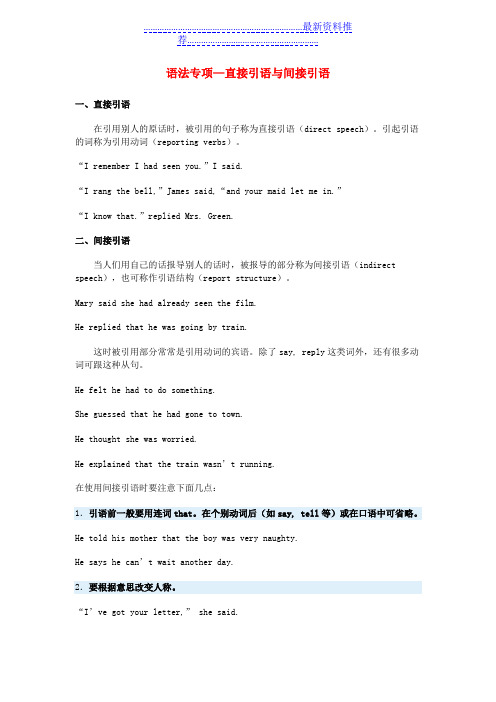
语法专项—直接引语与间接引语一、直接引语在引用别人的原话时,被引用的句子称为直接引语(direct speech)。
引起引语的词称为引用动词(reporting verbs)。
“I remember I had seen you.”I said.“I rang the bell,”James said,“and your maid let me in.”“I know that.”replied Mrs. Green.二、间接引语当人们用自己的话报导别人的话时,被报导的部分称为间接引语(indirect speech),也可称作引语结构(report structure)。
Mary said she had already seen the film.He replied that he was going by train.这时被引用部分常常是引用动词的宾语。
除了say, reply这类词外,还有很多动词可跟这种从句。
He felt he had to do something.She guessed that he had gone to town.He thought she was worried.He explained that the train wasn’t running.在使用间接引语时要注意下面几点:1.引语前一般要用连词that。
在个别动词后(如say, tell等)或在口语中可省略。
He told his mother that the boy was very naughty.He says he can’t wait another day.2.要根据意思改变人称。
“I’ve got your letter,” she said.→She said to him, “Your pronunciation is better than mine.”→3.引语中的谓语要和句子主要谓语在时态上一致。
直接引语变间接引语的转换

直接引语变间接引语的转换:〔一〕如何变人称:口诀:一随主,二随宾,第三人称不更新。
“一随主〞是指在直接引语变间接引语时,如果从句中的主语是第一人称或被第一人称所修饰。
从句中的人称要按照主句中主语的人称变化。
如:She said. “My brother wants to go with me. 〞→She said her brother wanted to go with her.“二随宾〞是指直接引语变间接引语时,假设从句中的主语及宾语是第二人称。
或被第二人称所修饰。
从句中的人称要跟引号外的主句的宾语一致。
如果引号外的主句没有宾语。
也可以用第一人称。
如:He said to Kate.“How is your sister now?〞→ He asked Kate how her sister was then.“第三人称不更新〞是指直接引语变间接引语时。
如果从句中的主语及宾语是第三人称或被第三人称所修饰,从句中的人称一般不需要变化。
如:Mr. Smith said, “Jack is a good worker.〞→ Mr. Smith said Jack was a good work er.〔二〕时态的变化①如果引述动词为现在时态,间接引语的动词可以保持原来的时态。
He says, “I have been writing a novel.〞------- He says that he has been writing a novel.He says:"that's all right."----- He says that's all right.②如果引述动词为过去时态,间接引语中的时间就要往后推,即现在时间推至过去时间,过去时间推至过去的过去,将来时间推至过去将来时间。
具体变化见下表:She said:"I am a student."------- She said (that) she was a student.(一般现在时变成一般过去时)She said:"He will go to see his friend"-----She said he would go to see his friend.(一般将来时变成过去将来时) Tom said:"I am going to play basketball tomorrow."The teacher said, “You are doing OK.〞老师说:“你们干得很不错。
直接引语变间接引语的讲解_2

记住: 动词时态的变化
直接引语 一般现在时 现在进行时 一般将来时
can
间接引语 一般过去时 过去进行时 过去将来时
could
may
might
1 陈述句 直接引语如果是陈述句,变为间接引语
时,用连词that引导(that在口语中常省略)
一般现在时
一般过去时
He said, “ I can do well in English.”
→Mr. Smith said Jack was a good boy.
Practice:
1) He said,“ My brother failed in the exam.” He said __h_i_sbrother had failed in the exam.
2) He said to Mary,“ How is your mother now?” he asked Mary how __h_e_r_mother was then.
What did he say?
He said he__w_e_n_t_t_o__b_e_a_ch__e_v_e_r_y_S_u__n_d_a_y__.
I go to beach every Sunday.
What did she say?
She said she_w__o_u_ld__c_a_l_l _m_e__to_m__o_r_r_o_w____.
宾 句宾语的人称保 up early”
early
持一致
三 引号内的第三人 She said to me , She told me that
不 称在变间引后去人 “ They want to That they wanted
直接引语变间接引语(1)

直接引语是 特殊疑问句 ,间接引语用 连接代词 (what∕which∕who∕whose等)或连接副词 (where∕how∕when∕why等)连接主从句,后面跟陈述语序。
eg:“What are you doing”Ted 直接引语为特殊疑问句 应改为:Ted asks me asks me.
与主句宾语me人称一致为第一人称 ③直接引语为第三人称时,变为间接引语人称不变。
eg:“He will come here today,”she says.
直接引语为第三人称 应改为:She says that he will come here today.(间接引语仍为he没变)
二、时态的变化
•
what
连接词
•
I am doing. 陈述语序
练习: A.把下列直接引语改为间接引语。
• • • • • • • • • 1.‘I will get a card from Jimmy,’Peter says. 2.‘I have just arrived,’Grandmother says. 3.‘He can't write very well,’ Lucy says. 4. ‘Are you a doctor,’she asks me. 5‘I have a headache,’he says. 6.‘Is that all,’she asks me. 7.‘I'm thirsty,’Mary says. 8.They tell us,‘It's time to have lunch.’ 9.He says,"I will water the flowers this afternoon.”
根据第一条:一随主 应改为:She says that she will go to Tokyo.
直接引语变间接引语(宾语从句)讲解与练习(附答案)知识讲解

直接引语变间接引语(宾语从句)讲解与练习一.讲解:在复合句中,作宾语的句子(主谓结构)就叫宾语从句。
直接引语变间接引语多数情况下构成宾语从句。
变化时应注意以下几点:1.引导词(连词)①如果直接引语是陈述句,变成间接引语,引导词用that, that没有实际意义,口语或非正式文体中常省略e.g He said, “My mother is a doctor.”→He said (that) his mother was adoctor.②如果直接引语是一般疑问句,变成间接引语,引导词就用if。
不能省略 e.g “Are youEnglish?” He asked m e→He asked me if I was English.③如果直接引语是特殊疑问句,变成间接引语,引导词就用特殊疑问句的疑问词,如:whatwhen where which who how等,这些词有意义,不能省略:eg “How old are you ?” He askedm e→He asked me how old I was.二.间接引语的宾语从句中,引导词之后都必须使用陈述语序,即“引导词+主语+谓语…),肯定式的宾语从句不用助动词do(did或does) e.g.She asked, “What does he want?”→She asked what he wanted.He asked me ,“Do you like English?”→He asked me if I liked English.三.时态的变化:1.如果主句中的谓语动词用一般过去时,则间接引语中宾语从句须用过去的某种时态。
基本原则是:往过去的方向推一个时态,即一般现在时变成一般过去时,现在进行时变成过去进行时,一般将来时变成过去将来时eg:① He asked me, “Do you have a dictionary?”→He asked me if I had a dictionary.② She asked, “What is Tom doing? →She asked what Tom was doing.③ She said ,“I will leave a message on his desk.”→She said that she would leavea message on his desk.2.如果宾语从句表达的是客观真理,自然现象。
高中语法-直接引语转换间接引语讲解(附答案)

直接引语与间接引语直接引语:一字不改的引用或复述别人的话,被引用或复述的部分即为直接引语。
一般前后用引号,首字母大写。
间接引语:用自己的话转述别人的话,被转述的部分即为间接引语。
通常以宾语从句的形式出现,不用引号。
直接引语变为间接引语时,要注意人称、时态、连接词、语序以及时间状语、地点状语、指示代词及方向性动词的变化。
一、人称变化直接引语是第一人称变为间接引语时,一般要变为第三人称;第二人称变为与主句的间接宾语相一致的人称(如果没有间接宾语,可根据上下文的体会确定一个人称);第三人称一般不改变。
例如He told me,"I’ll give you a book when I meet you again."—He told me he would give me a book when he met me again.二、时态的变化如果主句是过去式态,变为间接引语时应向前推一个时态。
即一般现在时---一般过去式,现在进行时---过去进行时,现在完成时---过去完成时,一般过去时---过去完成时,过去进行时---过去进行时,一般将来时---过去将来时,现在完成进行时---过去完成进行时,过去完成时---过去完成时,过去完成进行时---过去完成进行时。
等。
例如She wondered:"When will the meeting begin."—She wondered when the meeting would begin.但在以下几种情况下,间接引语的时态不用变化。
1、当直接引语表示的是客观真理或经常性的特点时。
例如 She said,"The earth goes around the sun".--She said that the earth goes around the sun.2、当直接引语中有绝对具体的过去时间作状语时,保持原来的一般过去时。
例如 He said,"I left home in 1942.—He said he left home in 1942.注:间接引语中的谓语动词有时需要适当的调整。
英语直接引语和间接引语(1)

直接引语和间接引语(DirectSpeechandindirectSpeech)1直接引语:直接引述他人的原话,叫直接引语。
间接引语:用自己的话转述他人的话,叫间接引语。
间接引语在多半状况下组成宾语从句。
直接引语一般前后要加引号,间接引语不用引号。
比如:MrBlacksaid, “I'mbusy”布莱克先生说:“我很忙”(直接引语)MrBlacksaidthathewasbusy. 布莱克先生说他很忙。
(间接引语)1、直接引语假如是陈说句,变成间接引语时,用连词 that 指引(that在口语中常省略),从句中的人称、时态、指示代词、时间状语、地址状语等要作相应变化。
在这一方面,汉语和英语有很多相像之处,所以,在做直接引语和间接引语变换练习时,要特别注意句子的意义。
1)人称的变化a)Hesaid, “Ilikeitverymuch.”他说:“我特别喜爱它。
”Hesaidthathelikeditverymuch. 他说他特别喜爱它。
b)Hesaid tome, “I'veleftmybookinyour room.”他对我说:“我把书放在你的房间里了。
”Hetoldmethathehadlefthisbookinmyroom.他告诉我他把书放在我的房间里了。
2)时态的变化如主句的谓语动词是一般过去时,直接引语变间接引语时,从句的谓语动词在时态方面要作相应的变化。
如主句的谓语动词是此刻时,从句的时态则无需变化。
时态的变化例句直接引语间接引语一般此刻时→一般过去时Hesaid, “I'mafraidIcan'tfinishthiswork.”Hesaidthathewasafraidhecouldn'tfinishthatwork.此刻进行时→过去进行时Hesaid, “I'musingthe knife. ”Hesaidthathewasusingtheknife.此刻达成时→过去达成时Shesaid, “IhavenotheardfromhimsinceMay.”ShesaidthatshehadnotheardfromhimsinceMay.一般过去时→过去达成Hesaid, “Icametohelpyou.”Hesaidthathehadcometohelpme.过去达成时不变Hesaid, “Ihadfinishedmyhomeworkbeforesupper.”Hesaidthathehadfinishedhishomeworkbeforesupper.指示代词、时间状语、地址状语和动词的变化:变化例句直接引语间接引语this-that这个-那个Shesaid, “Iwillcomethismorning." Shesaidthatshewouldgothatmorning.these-those这些=那些Hesaid,"Thesebooksaremine."Hesaidthatthosebookswerehis.now-then此刻-那时Hesaid,"Itisnine0'clocknow."Hesaidthatitwasnine0'clockthen.today-thatday今日-那一天Hesaid,"Ihaven'tseenhertoday."Hesaidthathehadn'tseenherthatday.yesterday-thedaybefore昨天-前一天shesaid,"Iwentthereyesterday." Shesaidthatshehadgonetherethedaybefore.tomorrow-thenext(following)day明日-次日shesaid,"I'llgotheretomorrow." Shesaidthatshewouldgotherethenext(following)day.here-there这里-那边come-go来-去注:(1)直接引语假如是客观真谛,变成间接引语时,时态不变。
直接引语变间接引语及其注意事项
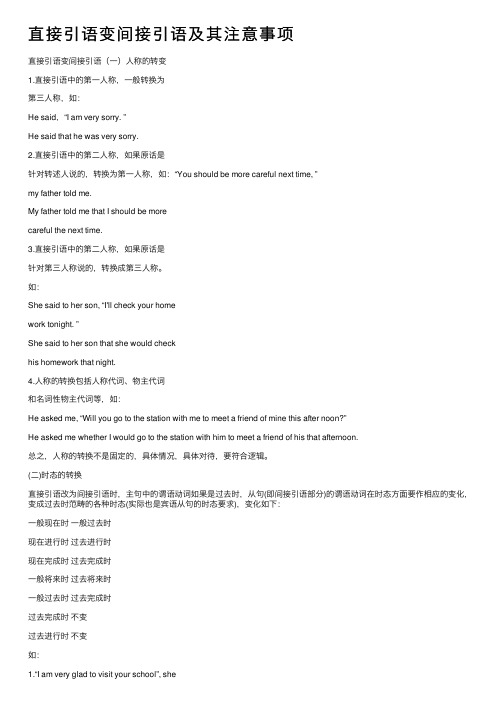
直接引语变间接引语及其注意事项直接引语变间接引语(⼀)⼈称的转变1.直接引语中的第⼀⼈称,⼀般转换为第三⼈称,如:He said,“I am very sorry. ”He said that he was very sorry.2.直接引语中的第⼆⼈称,如果原话是针对转述⼈说的,转换为第⼀⼈称,如:“You should be more careful next time, ”my father told me.My father told me that I should be morecareful the next time.3.直接引语中的第⼆⼈称,如果原话是针对第三⼈称说的,转换成第三⼈称。
如:She said to her son, “I'll check your homework tonight. ”She said to her son that she would checkhis homework that night.4.⼈称的转换包括⼈称代词、物主代词和名词性物主代词等,如:He asked me, “Will you go to the station with me to meet a friend of mine this after noon?”He asked me whether I would go to the station with him to meet a friend of his that afternoon.总之,⼈称的转换不是固定的,具体情况,具体对待,要符合逻辑。
(⼆)时态的转换直接引语改为间接引语时,主句中的谓语动词如果是过去时,从句(即间接引语部分)的谓语动词在时态⽅⾯要作相应的变化,变成过去时范畴的各种时态(实际也是宾语从句的时态要求),变化如下:⼀般现在时⼀般过去时现在进⾏时过去进⾏时现在完成时过去完成时⼀般将来时过去将来时⼀般过去时过去完成时过去完成时不变过去进⾏时不变如:1.“I am very glad to visit your school”, shesaid.She said she was very glad to visit ourschool.2.Tom said, “We are listening to the pop music. ”Tom said that they were listening to the pop music.3.Mother asked, “Have you finished your homework before you watch TV?”Mother asked me whether I had finished my homework before I watched TV.4.He asked the conductor, “Where shall I get off to change to a No. 3 bus?”He asked the conductor where he would get off to change to a No. 3 bus.5.“Why did she refuse to go there?”the teacher asked.The teacher asked why she had refused to go there.6.Mother asked me, “Had you finished your homework before you watched TV?”Mother asked me whether I had finished my homework before I watched TV.7.Tom said, “We were having a football match this time yesterday. ”Tom said that they were having a football match that time the day before.8.He said,“I haven't heard from my parents these days. ” He said that he hadn't heard from his parents those days.(三)时间状语、地点状语的变化1.直接引语是客观事实、普遍真理等,主句尽管是过去时态,变成间接引语时,时态仍然⽤⼀般现在时态。
(完整word版)直接引语和间接引语转换

语法直接引语变成间接引语时,要注意以下几点:人称变化、时态变化、宾语从句要用陈述句语序。
1。
直接引语是陈述句,变成间接引语时,由连词that 引导。
例如:She said, ”I am very happy to help you。
"→ She said that she was very happy to help you.2. 直接引语是一般/选择疑问句,变成间接引语时,由连词whether或if 引导。
例如: He asked me, ”Do you like playing football?"→ He asked me if/whether I liked playing football.注意:大多数情况下,if和whether 可以互换,但后有or not,或在动词不定式前,或放在介词后作连接词时,一般只用whether。
例如: She asked me whether he could do it or not。
3。
直接引语是特殊疑问句,变成间接引语时,由相应的疑问词who, whom, whose, how, when, why, where 等引导。
例如:My sister asked me, "How do you like the film?”→ My sister asked me how I liked the film.4。
直接引语是祈使句,变成间接引语时,把动词原形变成动词不定式,并在动词不定式前加tell, ask, order 等的宾语。
例如: The captain ordered, ”Be quiet.”→ The captain ordered us to be quiet。
注意:此种情况的否定句,在动词不定式前加not。
My teacher asked me,”Don’t laugh.”→ My teacher asked me not to laugh.5. 一些注意事项(1)间接引语一般要用陈述句的语序,即主、谓、宾的顺序.例如: He asked Lucy,”Where did you go?”→ He asked Lucy where she went。
经典直接引语变间接引语
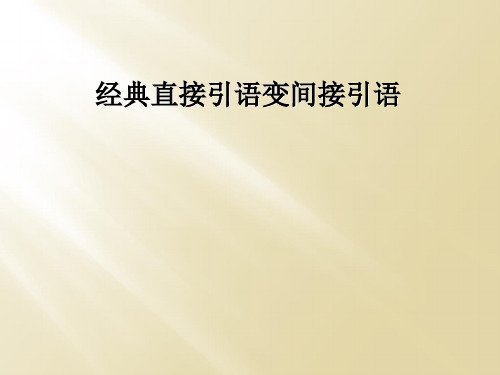
讲解注意点
直接引语变间接引语要注意以下 变化。
• 连接词 • 语序 • 时态 • 指代(人称、指示代词、时间状
语和地点状语)
注意连接词的变化
1.直接引语为陈述句,用that做连接词。 • He said, “Jim likes it very much.” • → He said that he liked it very much. 2.直接引语为一般疑问句,用if或wether做连接词。
you for a long time.” →Mr Smith said to his girl friend that he had not seen her for a long time.
直接引语改变为间接引语
2、直接引语如果是一般疑问句,变为间接引语时,需用从 属连接词whether或if引导,词序要改变。 Lily said to Miss Green, "Is it made in China?”
• →He asked his little sister not to cry any more.
What did Garfield say?
I’m lazy. He said he was lazy.
I’m hard-working sometimes. He said he was hard-working sometimes. I’m good at riding motorbikes. He said he was good at riding motorbikes. I’m better at dancing than singing.
He said he was better at dancing than singing.
高中英语直接引语变间接引语经典归纳(含答案)

直接引语变间接引语(宾语从句)一.直接引语和间接引语的定义。
直接引语:直接引用别人的话叫直接引语,间接引语:用自己的话转述别人的话叫间接引语。
直接引语前后加引号;间接引语不必加引号。
He said, “ I’m a student.” (直接引语)→ He said that he was a student. (间接引语)主句从句主句从句二.当直接引语为特殊疑问句变间接引语形成宾语从句时,首先要注意用特殊疑问词,其后用陈述语序的句子,同时注意人称、时态、时间状语,连接词,语序的变化.(一)人称的变化规则:一随主,二随宾,第三人称不更新。
★(二).时态变化宾语从句时态变化规则:主现从不限;主过从四过(即4种过去的时态:一般过去时;过去进行时;过去将来时;过去完成时);客观真理,只用一般现在时。
1.主句一般现在时,从句可用任意时态。
2.主句过去时,从句用相应的过去时态。
即一般现在时改成一般过去时;现在进行时改成过去进行时;一般将来时改成过去将来时;一般过去时、现在完成时、过去完成时改成过去完成时。
3.主句过去时,从句是客观真理时,只用一般现在时。
Teacher told us:" The moon moves round the earth."Teacher told us the moon moves round the earth.(三)★(四).连接词1.从句为陈述句,常选择连接词that或将that省略,直接与主句相连。
2.从句为一般疑问句,常选择连接词if或whether。
3.从句为特殊疑问句,常选择what,when,where,which,who,how等的疑问代、副词作连接词。
注意:当who为主语时,句式为:who+谓语+其他注意:1. 语序不变的有:What’ the matter with you? What’s wrong with you?但What’s the trouble with you?的语序要变1)从句中有or / or not 。
高一英语语法直接引语变成间接引语的句子结构的变化

直接引语变成间接引语的句子结构的变化1)陈述句He said, “I have been to the Great Wall. ” ——— He said to us that he had been to the Great Wall.用连词that引导,that在口语中常省略。
主句的谓语动词可直用接引语中的said, 也可用told来代替,注意,可以说said that, said to sb. that, told sb. that,不可直接说told that2)一般疑问句He said, “Do you have any difficulty with pronunciation?”He asked (me) whether/if I had any difficulty with my pronunciation.间接引语用连词whether或if引导,原主句中谓语动词said要改为asked(me/him/us等),语序是陈述句的语序3)特殊疑问句He said to me,“What's your name?” ———— He asked me what my name was.原来的疑问词作为间接引语的连词,主句的谓语动词用ask(sb. )来表达,语序改为陈述句语序4)选择疑问句He asked, “Do you speak English or French?” ————He asked me whether I spoke English or French.用whether…or…表达,而不用if…or…,也不用either…or…5)祈使句如果直接引语是祈使句,间接引语要用不定式的复合结构改,即改为:tell (ask, order, warn, advise等) sb. (not) to do sth. 如:The policeman said to the children, “Don’t play football in theThe policeman told the children not to play football in the street.“Listen to me carefully, please.” the teacher said to us.The teacher told us to listen to him carefully.【温馨提示】如果祈使句中出现了please, 在间接引语中必须省略。
高一英语 直接引语变间接引语,360度无死角!

高一英语▏直接引语变间接引语,360度无死角!一. 语法讲解直接引述别人的原话,叫直接引语,直接引语通常都用引号括起来。
用自己的话把别人的话陈述出来,叫间接引语。
间接引语在多数情况下都构成一个宾语从句。
Direct SpeechShe said, “I like singing. ”She said, “I am waiting for a bus.”Indirect SpeechShe said she liked singing.She said she was waiting for a bus.总结:直接引语是陈述句,变为间接引语时用连词that引导宾语从句。
从句中的人称、时态、指示代词、时间状语和地点状语等相应变化。
Direct SpeechShe asked, “Have you seen the film?”He asks, “Are you a doctor, John?”She asked us, “Where are you going to get off?”He asked them, “Who gave you a talk yesterday?”Indirect SpeechShe asked me whether/if I had seen the film.He asks John if/whether he is a doctor.She asked us where we were going to get off.He asked them who had given them a talk the day before.总结:直接引语是一般疑问句,变为间接引语时,用连词if或whether连接。
直接引语是特殊疑问句,变为间接引语时,仍用原来的疑问词作连词来引导。
Direct SpeechThe teacher said to the students,“Use your time wisely.”She said to me,“Open the door.”The teacher said to the students,“Don’t waste your time.”Indirect SpeechThe teacher told the students to use their time wisely.She asked me to open the door.The teacher told the students not to waste their time.总结:直接引语是祈使句时,采用“动词+宾语+不定式”结构,即ask/tell/order sb. (not) to do sth.注意:直接引语如果是客观真理,变间接引语时,时态不变。
英语直接引语和间接引语

直接引语和间接引语(Direct Speech and indirectSpeech) 1之迟辟智美创作直接引语:直接引述他人的原话,叫直接引语.间接引语:用自己的话转述他人的话,叫间接引语.间接引语在大都情况下构成宾语从句.直接引语一般前后要加引号,间接引语不用引号.例如:Mr Black said, “I'm busy” 布莱克先生说:“我很忙”(直接引语)Mr Black said that he was busy. 布莱克先生说他很忙.(间接引语)1、直接引语如果是陈说句,酿成间接引语时,用连词that 引导(that在口语中常省略),从句中的人称、时态、指示代词、时间状语、地址状语等要作相应变动.在这一方面,汉语和英语有许多相似之处,因此,在做直接引语和间接引语转换练习时,要特别注意句子的意义.1)人称的变动a) He said, “I like it very much.”他说:“我非常喜欢它.”He said that he liked it very much.他说他非常喜欢它.b) He saidto me, “I've left my book in your room.” 他对我说:“我把书放在你的房间里了.”He told me that he had left his book in my room.他告诉我他把书放在我的房间里了.2)时态的变动如主句的谓语动词是一般过去时,直接引语变间接引语时,从句的谓语动词在时态方面要作相应的变动.如主句的谓语动词是现在时,从句的时态则无需变动.时态的变动例句直接引语间接引语一般现在时→一般过去时He said, “I'm afraid I can't finish this work.”He said that he was afraid he couldn't finish that work.现在进行时→过去进行时He said, “I'm using theknife.”He said that he was using the knife.现在完成时→过去完成时She said, “I have not heard from him since May.”She said that she had not heard from him since May.一般过去时→过去完成He said, “I came to help you.”He said that he had come to help me.过去完成时不变He said, “I had finished my homework before supper.”He said that he had finished his homework before supper.3)指示代词、时间状语、地址状语和动词的变动:变动例句直接引语间接引语this-that这个-那个She said, “Iwill come this morning."She said that she would go that morning.these-those这些=那些He said, "These books are mine."He said that those books were his.now-then现在-那时He said, "It is nine 0'clock now."He said that it was nine 0'clock then.today-that day今天-那天He said, "I haven't seen her today."He said that he hadn't seen her that day. yesterday-the day before昨天-前一天she said, "I went there yesterday."She said that she had gone there the day before. tomorrow-the next(following) day明天-第二天she said, "I'll go there tomorrow."She said that she would go there the next (following) day.here-there这里-那里come-go来-去注:(1)直接引语如果是客观真理,酿成间接引语时,时态不变.如:He said, "Light travels much faster than sound."He said that light travels much faster than sound.(2)如果在本地转述,here 不用改为there,动词come 不用改为go. 如果在当天转述yesterday, tomorrow 等时间状语也不用改变.直接引语变间接引语.见下表.分类连接词例句注意事项弥补说明当直接引语为“陈说句”时连接词:that(口语中经常省略)He says, “ I will go to the park tomorrow.”--He says (that) he will go to the park tomorrow.He said, “ I will go to the park tomorrow.”--He said (that) he would go to the park tomorrow.He said to me, “ you can help her.”--He said to me (that) I could help her.. 1. 连接词:that2. 人称:1主,2宾,3不变3. 时态. 1. 黑体部份是连接词.斜体部份为间接引语部份.2. 间接引语部份均为陈说语序.3. 间接引语部份实际上是宾语从句,连接词之间的叫主句.4. 当主句是一般现在时态,间接引语部份与直接引语的时态相同.5. 当主句是一般过去时态,间接引语部份酿成相应的过去时态.当直接引语是“一般疑问句”时.连接词:if或者whether.可译为:是否He asked me, “Are you good at math?’---He asked me if I was good at math.He asked Amy, “ Do you love me?”---He asked Amy whether she loved him.He a sks me, “Is she reading?”---He asks me if she is reading. 1. 连接词:if , whether2. 语序:改为“陈说语序”.(去失落:Do, Does, Did改变Are, Is, Will, Can…位置)3. 人称:1主,2宾,3不变4. 时态.当直接引语为“特殊疑问句”时.连接词:直接引语中的特殊疑问词. He asked his wife, “How are you?”---He asked his wife how she was.He asked me , “ What color do you like?”---He asked me what color I liked.He asks me, “ where will she go 3 days later.”---He asks me where she will go 3 days later. 1. 连接词:特殊疑问词2. 语序:改为“陈说语序”.(去失落:Do, Does, Did改变Are, Is, Will, Can…位置)3. 人称:1主,2宾,3不变4. 时态.当直接引语为“祈使句”时没有连接词.用: ask(tell) sb. to do sth改写.或tell (ask) sb. not to do sth. 改写 He said to Amy, “Be careful!”--He asked Amy to be careful.He shouted, “ Lily, Close the door.”--He told Lily to close the door.He said to me, “Don’t be late.”--He asked me not to be late. 1. 不用连接词2. 不改变时态.3. 无须考虑语序4. 人称:1主,2宾,3不变 1. 斜体部份为间接引语部份.2.间接引语部份是动词不定式,在句中作宾语补足语.重点概括:直接引语变间接引语有着时态,人称,时间状语,地址状语的变动.1.时态变动:直接引语:一般现在时间接引语:一般过去时直接引语:现在进行时间接引语:过去进行时直接引语:一般将来时间接引语:过去将来时直接引语:现在完成时间接引语:过去完成时直接引语:一般过去时间接引语:过去完成时2.人称变动:She asked Jack,"Where have you been?"She asked Jack where he had been.3.指示代词的变动:thisthat;thesethoseHe said," These books are mine."He said that those books were his.4.时间状语的变动:nowthen;todaythat day;yesterdaythe day before;tomorrowthe next day/the following dayMy father said,“I worked here twenty years ago."My father said that he had worked there twenty years before. 5.地址状语的变动:herethereHe asked me,“How can I get here?"He asked me how he could get there.直接引语变间接引语的句式变动:1.陈说句:间接引语用that连接或that连接词省略.2.一般疑问句:间接引语用if或whether, said改为asked,句子用陈说语序.3.特殊疑问句:间接引语用原来的特殊疑问词引导,句子用陈说句语序.4.语法知识归纳直接引语的祈使句变间接引语的方法:要将祈使句动词原形酿成带“to”的不定式,而且在不定式的前面根据意思加上tell,ask,order等词,如果是否定式,不定式前面加"not"."Open the window," the teacher said to the boy.The teacher told the boy to open the window."Tell him to come in," the boss said to the secretary.The boss told the secretary to tell him to come in."Don't leave the door open," he said.He told us not to leave the door open.。
- 1、下载文档前请自行甄别文档内容的完整性,平台不提供额外的编辑、内容补充、找答案等附加服务。
- 2、"仅部分预览"的文档,不可在线预览部分如存在完整性等问题,可反馈申请退款(可完整预览的文档不适用该条件!)。
- 3、如文档侵犯您的权益,请联系客服反馈,我们会尽快为您处理(人工客服工作时间:9:00-18:30)。
直接引语& 间接引语(1)一、如何变人称:学生在将直接引语变间接引语时。
常常弄不清人称变化。
下面有一句顺口溜“一随主。
二随宾,第三人称不更新”。
“一随主”是指在直接引语变间接引语时,如果从句中的主语是第一人称或被第一人称所修饰。
从句中的人称要按照主句中主语的人称变化如:She said. "My brother wants to go with me. "→She said her brother wanted to go with her.“二随宾”是指直接引语变间接引语时,若从句中的主语及宾语是第二人称。
或被第二人你所修饰。
从句中的人称要跟引号外的主句的宾语一致。
如果引号外的主句没有宾语。
也可以用第一人称,如:He said to Kate. "How is your sister now?"→He asked Kate how her sister was then。
“第三人称不更新”是指直接引语变间接引语时。
如果从句中的主语及宾语是第三人称或被第三人称所修饰从句中的人称一般不需要变化如:Mr Smith said。
"Jack is a good worker。
"→Mr Smith said Jack was a good worker。
二、如何变时态:直接引语在改为间接引语时、时态需要做相应的调整。
现在时它需改为过去时态;过去时态改为完成时;过去完成时则保留原来的时态。
如:1)She said. "I have lost a pen."→She said she had lost a pen2)She said. "We hope so."→She said they hoped so.3) She said. "He will go to see his friend。
"→She said he would go to see his friend。
但要注意在以下几种情况下。
在直接引语变为间接引语时,时态一般不变化。
①直接引语是客观真理。
"The earth moves around the sun and the moon moves around the earth, the teacher told me. → The teacher told me the earth moves around the sun and the moon moves around the earth。
②直接引语是过去进行时,时态不变。
如:Jack said. "John, where were you going when I met you in the street?"→Jack asked John where he was going when he met him in the street。
③直接引语中有具体的过去某年、某月、某日作状语,变为间接引语时,时态不变。
如:Xiao Wang said. "I was born on April 2l, 1980。
" →Xiao Wang said he was born on April 20, 1980。
④直接引语如果是一般现在时。
表示一种反复出现或习惯性的动作,变间接引语,时态不变。
如:He said, "I get up at six every morning。
" →He said he gets up at six every morning。
⑤如果直接引语中的情态动词没有过去时的形式(例:ought to,had better, used to)和已经是过去时的形式时,(例:could, should, would, might)不再变。
如:Peter said. "You had better come have today。
" →Peter said I had better go there that day。
三、如何变状语:直接引语变间接引语,状语变化有其内在规津,时间状语由“现在”改为“原来”(例:now变为then, yesterday。
变为the day before)地点状语,尤其表示方向性的,或用指示代词修饰的状语,由“此”改为“彼”(例:this 改为that),如:H e said, "These books are mine." →He said those books were his.四、如何变句型:①直接引语如果是陈述句,间接引语应改为由that引导的宾语从句。
如:She said, "Our bus will arrive in five minutes."→She said that their bus would arrive in five minutes.②直接引语如果是反意疑问句,选择疑问句或一般疑问句,间接引语应改为由whether或if引导的宾语从句.如:He said, "Can you swim, John?" →He asked John if he could swim."You have finished the homework, haven…t you?" my mother asked. →My mother asked me whether I had finished the homework."Do you go to school by bus or by bike?" →He asked me if I went to school by bus or by bike.③直接引语如果是特殊问句,间接引语应该改为由疑问代词或疑问副词引导的宾语从句(宾语从句必须用陈述句语序)。
She asked me, "When do they have their dinner?"→ She asked me when they had their dinner.④直接引语如果是祈使句,间接引语应改为"tell(ask, order, beg等) sb (not) to do sth."句型。
如:"Don‟t make any noise," she said to the children. →She told (ordered) the children not to make any noise. "Bring me a cup of tea, please," said she.→She asked him to bring her a cup of tea.⑤直接引语如果是以“Let…s”开头的祈使句,变为间接引语时,通常用“suggest +动句词(或从句)。
”如:He said, "Let‟s go to the film." →He suggested going to the film.或He suggested that they should go to see the film.直接引语& 间接引语(2)Ⅰ. 引导词的选择及语序1. 陈述句:S + V + that + 陈述语序(S + V)“That is the trouble”, said Bill.改为:Bill said _________ _________ _________ the trouble.【注】:that 可省略,但如果是两个或两个以上的宾语从句并列,则第二个that不可省略。
He told me (that) he had finished his work and that he would like to have a holiday.2. 一般疑问句:S + V + if / whether + 陈述语序(S + V)He asked, “Are you leaving tonight?”改为:He asked us _________ _________ _________ leaving that night.3. 特殊疑问句:S + V + what / who / which / whose / when + 陈述语序(S + V)“Why did you lock the door?” father said to Anne.改为:Father asked Anne _________ _________ _________ _________ the door.4.祈使句:S + V + sb. to do / not to do(1)表示“命令”:tell, order, command(2)表示“请求”:ask, beg, request(3)表示“建议”:advise, suggest“Don‟t make noise in the library.” the teacher said to the students.改为:The teacher _________ the students_________ _________ _________ noise in the library.Ⅱ. 时态的一致1.主句是过去时,变间接引语时,从句时态向“过去”退一步:2.直接引语是客观真理时,变成间接引语时时态不变:The teacher said, “The earth goes round the sun.”改为:The teacher _________ _________ _________ _________ noise in the library.3. 直接引语中有明确表示过去时间状语的,变成间接引语时时态不变:Wei Fang said, “I was born in 1994.”改为:Wei Fang said _________ _________ _________ born in 1994.4.直接引语前面的主句谓语是现在时态,变间接引语时,时态不变:He says, “I have been married for 3 years.”改为:He said that _________ _________ _________ _________ for 3 years.Ⅲ. 人称及状语的变化1.人称变化:“一主二宾三不变”(直接引语中若出现第一人称则看主句主语,第二人称看主句宾语,第三人称无须变)试观察:She said to him, “I am very hungry.”改为:She told him that she was very hungry.She said to him, “You are very nice.”改为:She told him that he was very nice.She said to him, “Lily is very nice.”改为:She told him that Lily was very nice.2.状语与限定词变化:“这这那那,来来去去”Ⅳ. Exercise一.改写句子(把直接引语改为间接引语)1.“I am having supper,” he said.改为:He said that _________ _________ having supper.2.“I‟ve seen the film,” Gina said to me.改为:Gina _________ me that _________ _________ _________ the film.3.“I went home with my sister,” she said.改为:She said that _________ _________ _________ home with her sister.4.The teacher said, “The sun is bigger than the moon.”改为:The teacher said that the sun _________ bigger than the moon.5.“I met her yesterday,” he said to me.改为:He told me that he _________ _________ her _________ _________ _________.6.“You must come here before five,” he said.改为:He said that I _________ to go _________ before five.7.“Were you born in 1979?” he said.改为:He _________ me _________ I _________ born in 1979.8.He said, “You can sit here, Jim.”改为:He _________ Jim that he _________ _________ _________.9.He asked, “How did you find it, mother?”改为:He asked his mother _________ _________ _________ _________ it.10.“Where have you been these days?” he asked.改为:He asked me _________ _________ _________ been _________ days.11.“Do you know where she lives?” he asked.改为:He asked _________ _________ knew where she _________.12.“Keep quite, children.” he sa id.改为:He _________ the children _________ _________ quite.13.“Don‟t look out of the window,” she said.改为:She _________ me _________ _________ _________ out of the window.14.“Are you interested in this?” he said.改为:He _________ _________ I was interested in _________.二.句子翻译:1. 汤姆说他2009年加入了这家驾驶俱乐部。
